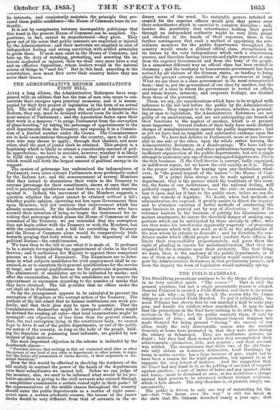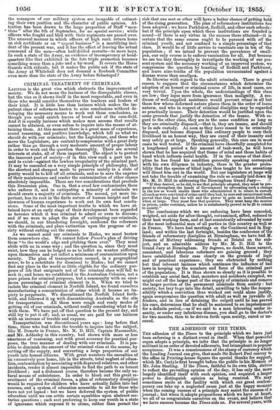THE FIELD-MARSHALS.
Tot Struldbrug promotions continue to be the theme of discussion in no very satisfied spirit. "The reason?" That is still the
general question, but not a single presentable reason is alleged. ' General Pelissier is created a Field-Marshal, and there is no neces- sity to ask why ; as little as to ask the reason why Sir Tames Simpson is not created Field-Marshal. To put it colloquially, Ge- neral Pelissier has shown that he can marshal a field to some pur- pose, and handle his soldiers when marshalled. It may be said that the promotions in the East have nothing to do with these pro- motions in the West; but the public connects them, if only by coincidence of time ; and if lieutenant-General Simpson was- made General for being present " during " the success of our allies, really the only discoverable reason why the ancient Generals at home were promoted is, that they were alive during the victory at Sebastopol. They are meritorious persons, no doubt ; but they had their reward when they accomplished their achievements—promotion, title, and pension ; and their account was settled. The circumstance that while two of the old Gene- rals only obtain an honorary distinction, Lord Hardinge, by being in active service, has a large increase of pay, ought not to have been a reason for the triple promotion, but against it, as it suggests the very lowest of motives. And the suggestion that the Court had any hand in it, as the jobbing of one kind of support against another,—a sort of barter of baton and pay against shako and tunic,—must be dismissed at once, as too monstrous a charge against high persons to be advanced without distinct evidence, which is here absent. The step therefore is, at present, simply un-
accountable.
The public is driven to only one way o. f accounting for -the act—that " the house over the way " is still too much in the state that Mr. Osborne described nearly a year .ego; that the managers of our military system are incapable of estimat- ing their own position and the character of public opinion. At- tention has been drawn to the large proportion of Staff "men- ' tions " after the 8th of September, for no special service; while officers who fought and bled with their regiments are passed over. The unusual manner in which officers of high rank return home on sick certificate or on " urgent business" is a mortifying inci- dent of the present war, and it has the effect of leaving the actual command of the men—often half-drilled recruits—to mere boys. In such a state of the Army, an evidence of incompetency at head- quarters like that exhibited in the late triple promotion becomes something worse than a joke and a by-word. It covers the Horse Guards with ridicule, but it makes the public ask if the state of the Army at Whitehall does not demand a Roebuck Committee even more than the state of the Army before Sebastopol?



























 Previous page
Previous page